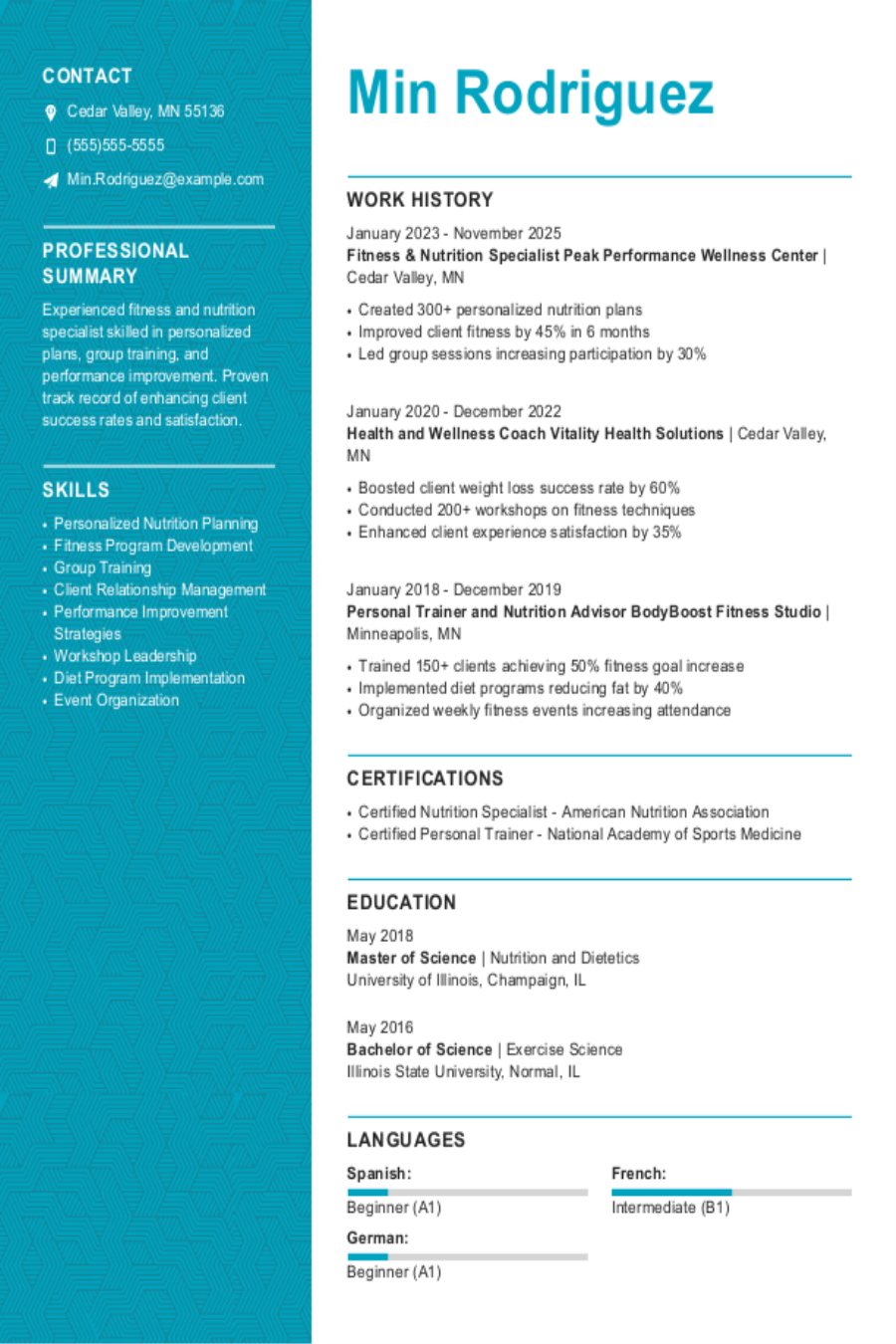Popular Manager Resume Examples
Entry-level manager resume
An entry-level resume for a manager should focus on leadership skills, relevant coursework, internships, and any volunteer experiences that demonstrate initiative and ability to work in a team.
Emphasizes soft skills: Despite limited years in managerial roles, this resume highlights strong soft skills, such as strategic planning and team leadership.
Prioritizes readability: Choosing a clean, straightforward simple resume template improves readability. This approach allows recruiters to quickly pinpoint qualifications and accomplishments without distractions.
Mid-career manager resume
A mid-career manager resume should emphasize a strategic mix of leadership experience, key skills, and professional development to effectively demonstrate growth and value to potential employers.
Includes mix of skills: This resume effectively highlights a mix of hard skills, such as CRM implementation and cost reduction, alongside soft skills like team leadership and employee training to illustrate the job seeker's comprehensive expertise.
Encourages quick scanning: A well-structured layout highlights key qualifications, allowing potential employers to quickly recognize the applicant's managerial expertise and achievements.
Experienced manager resume
An experienced manager resume should highlight leadership achievements and demonstrate growth in responsibilities to effectively showcase the applicant's professional journey and impact on previous organizations.
Highlights experience: The resume opens with a compelling summary that emphasizes 12 years of managerial expertise. This immediately establishes the job seeker's capability to lead teams and drive significant operational improvements, setting a confident tone for the entire document.
Optimized for ATS: This resume uses a polished template that features a professional header alongside an ATS-friendly resume format, optimizing visibility for recruiters and automated systems alike.
Manager Resume Template
Looking for a great way to kick off your job search? This manager resume template provides a solid framework you can easily adapt with your personal details and accomplishments.
Emily Huang
Spokane, WA 99208
(555)555-5555
Emily.Huang@example.com
Professional Summary
Dynamic manager with 9 years in strategic leadership, operations efficiency, and team development. Proven success in boosting revenue, optimizing workflows, and enhancing customer retention.
Work History
Manager
TechSavant Innovations - Spokane, WA
January 2023 - November 2025
- Led team to 15% growth annually
- Improved customer retention by 25%
- Reduced operational costs by $50K
Project Supervisor
Creative Solutions Group - Tacoma, WA
January 2019 - January 2023
- Streamlined operations saving 20%
- Enhanced project delivery 30%
- Boosted client acquisition by 10%
Operations Coordinator
NextGen Enterprises - Seattle, WA
February 2016 - January 2019
- Optimized workflow efficiency 18%
- Increased team productivity 25%
- Implemented $200K budget strategy
Skills
- Leadership
- Project Management
- Strategic Planning
- Operations Efficiency
- Cost Reduction
- Customer Retention
- Team Development
- Budget Management
Certifications
- Certified Project Management Professional - Project Management Institute
- Lean Six Sigma Green Belt - American Society for Quality
Education
Master of Business Administration Business Management
Harvard University Cambridge, MA
May 2015
Bachelor of Science Economics
University of California, Berkeley Berkeley, CA
May 2013
Languages
- Spanish - Beginner (A1)
- French - Beginner (A1)
- German - Intermediate (B1)
Must-Have Skills on a Manager Resume
A strong skills section is important for presenting your qualifications effectively on a resume.
This data highlights the most sought-after hard and soft skills for managerial positions based on insights from Resume Now’s internal resume data.
When you're ready to improve your resume, check out our AI Resume Skills Generator. It recommends both hard and soft skills tailored to your job title, so you can create a comprehensive and tailored skill profile.
Writing Your Manager Resume
Having explored effective resume examples, you are now prepared to dive into the process of making your own. We will guide you step by step through how to write a resume, so that each section contributes to your resume's success.
List your most relevant skills
An effective skills section on your manager resume should highlight both hard and soft skills relevant to management, such as leadership, team collaboration, and strategic planning. By tailoring this section with keywords from the job listing, you not only demonstrate your fit for the role but also improve your chances of passing through applicant tracking systems.
Including these keywords will resonate with human recruiters looking for specific competencies while ensuring that automated systems recognize you as a strong job seeker.
Example of skills on a manager resume
- Proficient in managing project timelines and budgets to ensure successful delivery
- Strong communicator who fosters collaboration across teams
- Adaptable leader with a focus on employee development and engagement
- Analytical thinker skilled in data-driven decision making
Including soft skills on your resume is essential because employers highly value interpersonal abilities. Demonstrating these traits, which can be challenging to develop, will set you apart from the competition.
Highlight your work history
Your work experience section is where you showcase your achievements and demonstrate how you've effectively used your skills in previous roles. Focus on what you've accomplished, not just what you did, by including metrics or examples that highlight your contributions to the team or organization.
For each job entry, be sure to include details like your job title, the name of the employer, and the dates of employment. This information provides context for your experience and helps employers quickly assess your background.
Example of a manager work experience entry
- Operations Manager
ABC Corporation - New York, NY
June 2019 - Present - Lead a team of 15 employees, fostering a collaborative environment that improved productivity by 25%
- Develop and execute strategic plans to improve operational efficiency, achieving a cost reduction of 15% over two fiscal years
- Implement performance metrics and conduct regular evaluations, resulting in a 30% increase in employee satisfaction scores
- Mentor junior staff members through skill development sessions, which improved team capabilities and reduced turnover by 10%
- Coordinate cross-functional initiatives to drive sales growth, contributing to a 20% year-over-year revenue increase
Aim for clarity in your resume bullet points. Include key achievements and specific contributions without excessive detail. Each point should communicate value while remaining concise, helping you stand out to potential employers.
Include your education
The education section of your manager resume should be organized in reverse-chronological order, starting with your most recent degree. Include any diplomas, degrees, and relevant certifications while omitting your high school diploma if you hold a higher qualification.
For those currently pursuing an education or having incomplete qualifications, it is important to list the highest level completed along with an expected graduation date. You can also improve this section by including bullet points that focus on key coursework or notable projects that align with managerial skills.
Common certifications for a manager resume
- Project Management Professional (PMP) – Project Management Institute (PMI)
- Certified ScrumMaster (CSM) – Scrum Alliance
- Lean Six Sigma Green Belt – International Association for Six Sigma Certification (IASSC)
- Certified Manager (CM) – Institute of Certified Professional Managers (ICPM)
Sum up your resume with an introduction
An effective profile section on your resume is important for making a strong first impression. It serves as your elevator pitch, giving hiring managers a snapshot of your career and what you bring to the table.
If you are an experienced applicant, a professional summary is most beneficial. This format allows you to highlight significant achievements and qualifications right at the top of your resume. By showcasing your accomplishments, you immediately capture attention and provide evidence of your capabilities, which can lead to further interest from employers.
If your background is limited, include a goals-based resume objective that reflects your dedication to learning and development.
Professional summary example
Results-driven manager with over 10 years of experience in team leadership and operational excellence. Demonstrated ability to improve productivity and foster a collaborative work environment, while successfully implementing strategic initiatives that drive business growth. Proficient in project management, budget oversight, and performance optimization.
Resume objective example
Enthusiastic manager eager to use strong leadership and communication abilities to foster team collaboration and drive project success. Committed to applying strategic planning and problem-solving skills to improve operational efficiency and support organizational growth.
Pro Tip: Your resume profile is your initial chance to stand out as an applicant. Look closely at the job description and weave in essential keywords that reflect the role's requirements. This strategy not only showcases your fit for the position but also improves your chances of getting past applicant tracking systems (ATS) used by many employers.
Add unique sections to set you apart
Optional resume sections can improve your application by highlighting your unique qualifications for manager positions. These sections allow you to present additional skills or experiences that set you apart from other applicants.
Including relevant hobbies and volunteer work in your resume not only showcases your interests but also reflects your values and commitment. By demonstrating how you spend your time outside of work, you provide employers with insights into your leadership style and teamwork abilities. This holistic view helps them understand how you'll contribute to their organization beyond just the basic job requirements.
Three sections perfect for a manager resume
- Languages: As a manager, your role requires clear communication. Highlight any language skills to show your ability to reach diverse teams on your resume.
- Volunteer Work: Including volunteer work on a resume can improve your professional profile. It showcases your skills and demonstrates your dedication to making a positive impact in the community, appealing to potential employers who value social responsibility.
- Accomplishments: As a manager, quantifiable accomplishments are vital to illustrate your leadership impact. Bring attention to these achievements by adding them to your work experience or listing them in a special accomplishments section.
5 Resume Formatting Tips
- Choose a format that matches your career stage.
Choosing the suitable resume format depends on your career level and experience. If you possess extensive experience, a chronological format can showcase your career progression effectively. For individuals just beginning their careers, a functional resume is ideal for highlighting skills. A combination format is beneficial for presenting both skills and experiences if you have diverse backgrounds.
- Pick a smart resume template.
Using a professional resume template is essential for improving readability and ensuring your key information stands out. A well-structured template not only saves time on formatting but also increases your chances of passing through applicant tracking systems, making it easier for hiring managers to review your qualifications at a glance.
- Select an appropriate font.
Choose from professional fonts like Helvetica or Garamond to improve resume readability for ATS and recruiters alike.
- Use consistent formatting.
Ensure your resume is neatly aligned with uniform margins. This creates a polished look that improves readability and presents you as a detail-oriented job seeker.
- Keep your resume to one or two pages.
When outlining your resume, remember that resumes should be one page long. Concentrate on including only the most relevant information. This approach will help you present your experience clearly and effectively while keeping it engaging for potential employers.
Tools for Your Job Search
Are you ready to advance your career as a manager? Before submitting your application for that exciting position, consider using our ATS Resume Checker. This essential tool offers insights on how effectively your resume aligns with the automated systems many companies use for initial applicant screenings.
Looking to elevate your resume even further? Our AI Resume Builder provides tailored content suggestions specific to your management experience, along with professionally designed templates that highlight your leadership skills and achievements in a compelling way.
Frequently Asked Questions
Last Updated: November 24, 2025
Absolutely. A cover letter is important because it adds depth to your resume and provides an opportunity for you to connect with potential employers on a more personal level. It allows you to express your enthusiasm for the role while showcasing how your specific experiences make you a strong applicant. Don’t overlook this chance—write a cover letter that improves your application.
To simplify the process, consider using our AI Cover Letter Generator, which quickly helps you create tailored cover letters in just minutes. You can choose from various cover letter template options that complement your resume, ensuring consistency and professionalism in your job application materials.
A resume is typically concise, spanning one to two pages, while a CV (curriculum vitae) can extend several pages and includes comprehensive details about your academic background, research contributions, publications, and professional experiences. This difference in length and content reflects the varying purposes of these documents.
CVs are often required for specialized roles in academia, science, law, and medicine. If you find yourself needing to prepare a CV for such positions, our online CV Maker is here to assist. With various CV templates tailored for different industries and career levels, you can create a polished CV quickly and efficiently—making the process as seamless as possible.
A manager's resume should ideally be one page, which is usually enough to highlight key skills and experiences. However, applicants with extensive backgrounds may choose a two-page resume format to better showcase their qualifications and achievements.
Selecting the right resume format hinges on your career level and unique strengths. Inexperienced applicants often thrive with a functional format, which highlights skills over experience. For seasoned professionals, a chronological format showcases a solid work history effectively. Mid-level applicants might find success with a combination format, mixing skills and experience for a comprehensive view. Tailoring your resume format to your situation can make all the difference in standing out to potential employers.
When addressing gaps on your resume, be honest about why they occurred. Use this space to highlight what you accomplished or learned during that time. If you engaged in volunteering, courses, or personal projects, mention them. This not only fills the gap but also demonstrates your commitment to growth. Shift the focus back to your qualifications and experience to show you're ready for the next step in your career.
A frequent resume error that managers make is submitting documents that aren't ATS-compatible. To prevent this, choose a simple, clean, and ATS-friendly resume template and tailor your resume to align closely with the job description you're applying for. This approach increases your chances of passing through the ATS filters successfully.
Was this information helpful? Let us know!
Hailey is a career advice writer dedicated to helping job seekers excel in their careers.
More resources

15 Latest Resume Trends for 2026 + Examples
In our dynamic global economy the job market and the expectat...

AI-Resistant Careers Index 2026: 20 Jobs That AI Can’t Replace
Resume Now s latest report breaks down the most AI-proof caree...

60% of U.S. Workers Expect AI to Eliminate More Jobs Than It Creates in 2026
Resume Now s newest report shows growing concerns about the im...

Interview-Winning Fitness and Nutrition Resumes Examples and Tips
Was this information helpful? Let us know ...



